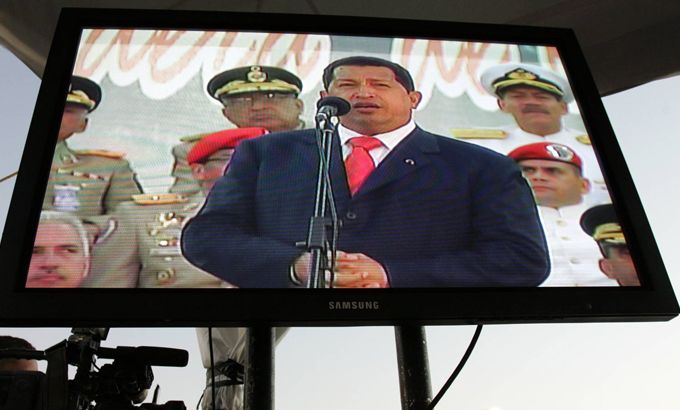
Hugo Chavez: Televising the revolution
As Chavez turned the cameras on the Venezuelan people as well as himself, how will the media shape after his death?
March 5, 2013, marked the end of President Hugo Chavez’s 14 year reign over Venezuela, but his image lives on, everywhere.
Depending on which news outlet you follow, Chavez is remembered as a dictator and a tyrant, or a charismatic visionary leader who stood up to the West. His media coverage seems as divided in death, as it was in life.
As president, Chavez redefined Venezuela’s media landscape, dismantling an industry dominated by the country’s business elites, taking on private media groups positioned at the opposite end of the economic and political spectrum. He turned the cameras on the Venezuelan people – his ‘chavistas’ – as well as himself.
The media landscape Chavez leaves behind is looking less and less polarised as the biggest opposition outlet is taken over by a business man allegedly linked to the government. Images of the late president will fade from Venezuelan TV screens as cameras refocus their lenses in search of a new leader. What shape will Venezuelan media take in the coming weeks?
To discuss the media legacy of Hugo Chavez, the Listening Post’s Marcela Pizarro speaks with Alonso Moliero, a news editor at the Contrabando magazine; Steve Rendall, a senior analyst for FAIR.org; author Oscar Guardiola-Rivera; and Luis Botello, from the International Center for Journalists.
In this week’s News Bytes: In Syria, a Ukrainian journalist kidnapped by rebel groups five months ago escapes from captivity; a new pope for the Vatican amidst an election process media blackout; and Angolan military generals are using the courts to silence the country’s most prominent investigative journalists
Thailand’s lese majeste problem
On December 5, 2012, thousands of Thais gathered in Bangkok to mark the 85th birthday of their monarch, King Bhumibol Adulyadej. The monarchy holds great importance in Thai life, so much so that a 100-year-old law that makes it a criminal offense to say or write anything deemed offensive about members of the royal family is still very much in existence.
It is known as Article 112 – the lese majeste law. And it is not just a symbolic relic – it has become a political weapon used with increasing frequency.
From a handful of cases six years ago, 2010 saw a steep escalation with almost 500 cases. In one of the most recent cases, magazine editor Somyot Pruksakasemsuk has been jailed for ten years for publishing articles that allegedly defamed the royal family.
In the second half of the show, the Listening Post’s Meenakshi Ravi reports on Thailand’s lese majeste problem.
In our weekly hunt for web videos, the Listening Post team have wised up to the key ingredients that make a video go viral. Throw together some cute babies or animals, mix in a few bloopers and you are on your way. The BBC has been airing a wildlife documentary series called ‘Penguins – Spy in the Huddle,’ in which 50 cameras where installed to film the penguins in their natural habitat. While promoting the series, they put a short promo online; and it looks to us as though it has all the elements in place for a viral hit. Our Web Video this week is ‘Penguin Fail.’ We hope you enjoy it as much we did.
Listening Post can be seen each week at the following times GMT: Saturday: 0830, 1930; Sunday: 1430; Monday: 0430. Click here for more Listening Post. |
